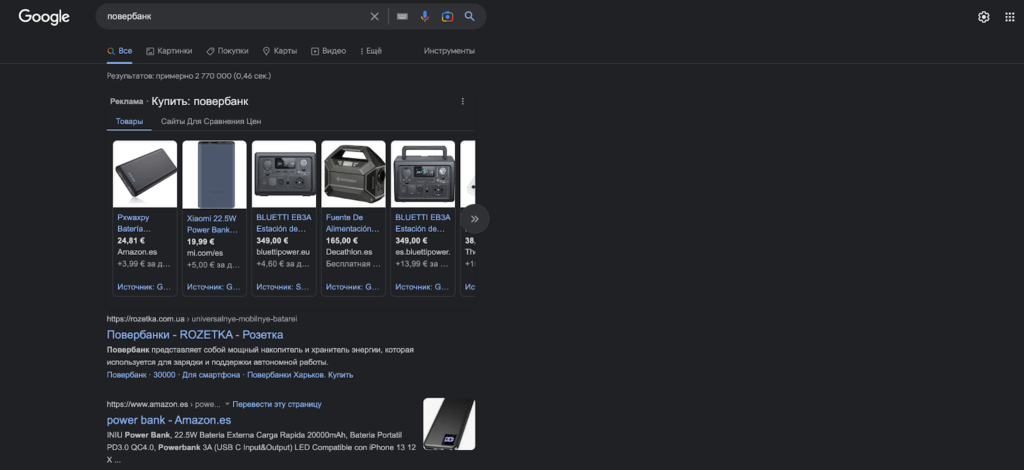SEO/Search Engine Optimisation/Promotion on the Internet is a set of measures aimed at getting your website into the TOP 10 of Google (or other search engines).
Let’s imagine that you want to buy a power bank and submit your request to a search engine. You will get something like this result:

First of all, Google will show you the advertising products that it promotes on a paid basis (this is called “contextual advertising” and is marked accordingly). Then you will see the “organic results” – that is, those sites that the search engine considers worthy of attention. And, based on its internal algorithms, it awards them the first positions in the rankings.
We also see the number of results: 2 770 000 (!!!). If you look at it from the point of view of a buyer, such diversity is certainly very encouraging.
But if you sell the same power banks, how do you attract visitors and convince them to come to you, ignoring millions of other offers? The answer is that your resource should be placed on the first page of search results, i.e. in the TOP. In fact, this is the main task of SEO optimisation: to ensure that your website is in the top position, to help you outperform competitors and attract visitors.
How many people do you think search for a product/service/information on the second page of Google? 50%? 10%?
No! 0.44%. Therefore, owners who do not engage in search engine optimisation are depriving their business of thousands of potential customers.
*research by Backlinko
According to the same study, only a year ago, the “reach” rate to the second page was almost twice as high at 0.78%. This means that buyers are becoming more selective and lazy with their time, and sellers need to make twice as much effort to attract attention.
You may think that to be in the top, it is enough to use paid contextual advertising. And you’d be right, because it will really quickly and effortlessly provide your website with a “place in the sun”. So why do you need to carry out organic promotion?
Firstly, SEO works for the long term, not just when you pour in an advertising budget. If you optimise your website at the start, you will get new customers steadily and relatively cheaply. Secondly, search engine optimisation involves a lot of internal work, which also has a favourable effect on sales.
To dive deeper into the topic, we suggest considering a comparative analysis.
| Indicators | SEO optimisation | Contextual advertising |
| Speed of getting results | A few months after the start of work | Immediately after the launch of the advertising campaign |
| Budgets | Cost of specialist work + payment for promotion services | The cost of a specialist’s work + budgets for displaying adverts |
| User attitudes | Perceived as a native recommendation | It is perceived as any other “paid” advertisement |
| Impact on technical condition and usability | Positive | None |
Let’s take a closer look at the last point. In order for a website to be ranked highly in search engines (i.e., to take the TOP spot), it must meet certain criteria. In particular, it should have fast loading speed, ease of use, a clear sitemap, no errors, etc. Of course, to achieve this, you need to implement a set of technical improvements. This involves certain financial costs.
When we talk about contextual advertising, Google doesn’t care about the state of your website. But a user who finds himself or herself on a “clumsy” website after a “beautiful” advert (i.e., inconvenient, with broken buttons, empty pages, and freezing) is unlikely to want to place an order. At the same time, the resource may look quite attractive visually, and without a detailed technical analysis from an SEO specialist, the owner may not even know what problems his customers are having.
Contextual advertising is the best way to get quick results. It is ideal for seasonal/holiday sales and single-page websites (landing pages). For example, if you are selling Christmas trees for the New Year and tulips on the eve of March 8, there is no point in bothering with SEO.
At the same time, search engine optimisation is the best choice for independent online stores and for promoting their pages on marketplaces such as Amazon. But, as mentioned above, SEO does not give quick results. Therefore, it is better to combine paid and free methods to maintain demand and increase sales in the short term.
We have already figured out what SEO website promotion is. Now let’s take a closer look at the methods that make up the complex of work.
1. Improving technical performance (internal optimisation). First of all, it means ensuring that the resource complies with the requirements of the World Wide Web Consortium (an international system of standards) and other search engine requirements. They relate to the security of users and their data, correct display on mobile and desktop devices, page loading speed, absence of duplicates, errors, functioning of individual modules, etc.
2. Work with usability and structure (note: usability is the ease of use for your client). Search engines and customers highly appreciate clear websites with easy navigation, all the necessary landing pages and competent linking.
3. Work with content (textual optimisation): compiling a semantic core, filling texts with keywords for user requests.
4. External optimisation (including crowd marketing). This means placing links to your pages on other websites.
You may find some of the steps described above unclear and require explanation. In this case, please contact us for more information. We will be happy to advise you on the SEO optimisation and promotion service from Nexus.